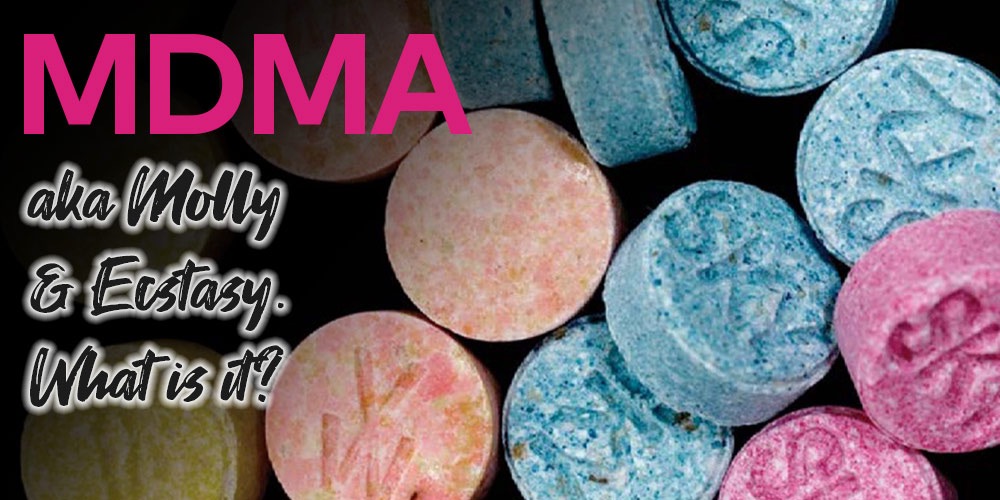
The MDMA Drug is considered a party drug that goes by many street names including:
- Molly
- Ecstasy
- E
- XTC
- Hug Drug
- Love Drug
More accurately, MDMA is often the main active ingredient in these street drugs.
MDMA is an illegal psychoactive drug that alters chemicals in the brain, which produces feelings of empathy, elevated mood, and peacefulness.
The chemical structure of MDMA is similar to methamphetamine and the hallucinogen mescaline.
MDMA is also very similar to the MDA Drug (methylenedioxyamphetamine) that goes by the names Sally, Sass or Sassafras.
The effects of these two drugs vary slightly, with MDA being more psychedelic and visual, while MDMA is more personable, with users feeling very close to each other.
People normally take MDMA and MDA orally, and they can be purchased in tablet form and also as a powder or capsule.
We’ll explore the history of MDMA, its effects, symptoms, and possible treatment pathways, in addition to the surprising effect of MDMA on octopuses.
MDMA Drug History
MDMA was invented by a German pharmaceutical company in 1912. Initially it was designed as an appetite suppressant and later gained popularity with a few psychiatrists for therapy in the 1980s. MDMA has never been officially approved for public use by the FDA and has been banned since 1985.
Since the 1980s, MDMA has been available as a street drug. However, interest in MDMA-assisted psychotherapy has recently regained scientific interest as a possible treatment for PTSD, social anxiety, and emotional health issues.
In 2017 the FDA granted MDMA “Breakthrough Therapy Designation,” for the treatment of PTSD. This means that they are urgently reviewing and clinically testing the drug for possible therapeutic treatments in the future.

MDMA Drug, Ecstasy and Molly Side Effects
The effects felt by a person that takes MDMA can differ, depending on the dose and purity of the drug. Pure MDMA will normally produce positive feelings, and as such it’s a popular stimulant. Serotonin molecules play a key role in the fuzzy high that is felt when a person takes ecstasy.
Molly is known as the purest form of MDMA, although many batches are rarely ever the same as another, and dealers cut their batches with a wide variety of substances. Finding pure MDMA is difficult, although dealers always say they offer the purest product available.
The drug releases the neurotransmitters serotonin, dopamine, and norepinephrine, which flood the brain with feel-good chemicals that produce a euphoric effect.
It also increases feelings of empathy, affection, and a closer connection to people who are using it together at the same time.
Many users report enhanced perception, happiness, relaxation, and sometimes mild hallucinations.
Adverse MDMA, Ecstasy and Molly Side Effects Can Include:
- Dehydration
- Nausea
- Increased heart rate
- Elevated blood pressure
- Profuse sweating and perspiration
- Loss of appetite
- Hyperthermia (high body temperature)
What Does Molly Do To You?
An MDMA or Molly high will typically last for 4 to 6 hours or longer, but again, this will vary from person to person, the amount taken, and the particular type ingested. The drug can be addictive and excessive use can alter the structure of the brain.
Brain scans have shown that MDMA decreases activity in the limbic system, which is the area of the brain responsible for emotional reactions. It also temporarily influences the communication between the prefrontal cortex and the temporal lobe.
Research scientist Dr. Robin Carhart-Harris from the Department of Medicine at the Imperial College London, said:
“We found that MDMA caused reduced blood flow in regions of the brain linked to emotion and memory. These effects may be related to the feelings of euphoria that people experience on the drug.”
Some interest in the possible therapeutic uses for MDMA has arisen because in healthy volunteers, MDMA seems to lessen the impact of painful memories. This makes sense, as substance users commonly take drugs for the relief of painful memories and emotions.
MDMA Drug and Octopuses
Despite the growing information from brain scans, some of the effects felt when a person takes MDMA are not fully understood.
When scientists from Johns Hopkins University gave MDMA to octopuses, they expected to see a very different effect to that observed in humans because octopuses have a decentralized central nervous system (CNS) and no cortex.
During the observation, the octopuses were said to float about the tank as though they were doing water ballet and also showed increased affection for other octopuses. Scientists concluded that the stigma around MDMA hides the potential beneficial properties of the drug.

Ecstasy Effects on the Body
Because MDMA is a psychoactive stimulant, some of the withdrawal symptoms are similar to those of cocaine or amphetamine withdrawal when the drug begins to wear off and the user comes down from the high.
After taking MDMA Drug for just one week, severe withdrawal symptoms can occur including:
- Depression
- Suicidal thoughts
- Impulsiveness
- Disturbed Sleep
- Nausea
- Anxiety
- Attention and memory deficits
- Fatigue
If a person has become addicted to MDMA and wants to recover, it’s advisable for them to go through withdrawal in a medically supervised environment. Like cocaine, because the drug creates pleasurable feelings, people learn to rely on the drugs to experience joy in their life.
MDMA Health Risks
There are many health risks due to taking MDMA. As a recreational drug, the powder or capsules are often laced or cut with harmful chemicals.
Sometimes dealers sell MDA or PMA (paramethoxyamphetamine) as MDMA, and the users unknowingly take a substance they aren’t familiar with and experience a different high than they were expecting.
Additionally, MDMA enhances empathy and feelings of closeness, so people can put themselves at risk of sexually transmitted diseases, such as HIV, AIDS, or hepatitis.
Besides the adverse side effects perviously mentioned, other health risks from taking MDMA sometimes include:
- Heart Failure
- Kidney Failure
- Death
Treatment and Harm Reduction for MDMA Drug Misuse
People who use MDMA don’t die from an overdose, but instead from other side effects like heart failure or dehydration. For this reason, harm reduction is important for those who use it regularly.

MDMA Harm Reduction Tips include:
- Stay well-hydrated
- Never use it alone in case of an emergency
- Don’t take too much
- It’s not advised to mix with alcohol or other drugs
- Refrain from using if other medical conditions exist such as heart or blood pressure issues
Designer drugs like MDMA or MDA are popular with teens and young adults who don’t have much experience with drugs. They also have developing brains that are especially sensitive to the changes brought on by flooding the brain with neurotransmitters, so abstaining from use is the best advice.
Any drug can be addictive, yet the rates of addiction for MDMA are quite low when compared to other drugs such as alcohol, heroin, cocaine, and methamphetamine.
Most users only sporadically take the drug for parties or raves, even though some people take it more frequently and become dependent on its effects. Overuse of MDMA can alter the structure and function of the brain, making it difficult to find joy or happiness.
MDMA and Molly addiction treatment often includes Motivational Enhancement Therapy (MET) and Cognitive Behavioral Therapy (CBT) along with an individualized treatment plan that emphasizes a natural connection with others.
Related Posts
- Long Term Side Effects of Drugs and Addiction
There's a lengthy list of long-term side effects of drugs and addiction that affect both…
- 9 Celebrities Who Overcame Their Heroin Drug Addiction
In the past, many famous people have kept quiet about their addictions. Thanks to the…
- Is Addiction a Disease or a Choice?
Is addiction a disease? Is alcoholism genetic? Or is it simply a personal choice? These…
